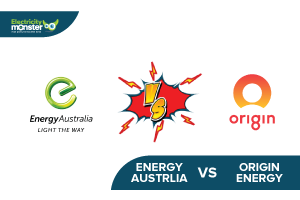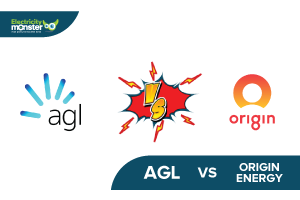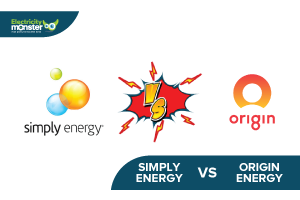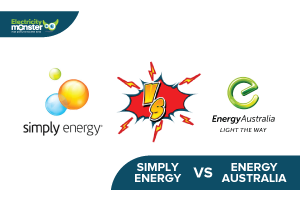Contents
Find Out Who Provides Better Value - Energy Australia or AGL
The main difference between Energy Australia vs AGL is the individual value each retailer offers in terms of rates, solar feed-in tariffs, and more. Both providers boast a range of competitive energy plans and market offers, but only one provides customers with the best value overall.
Energy Australia and AGL are major players in the electricity retail market. Part of the well-known “Big 3”, which consists of AGL, Origin Energy, and Energy Australia these two energy providers have become a household name largely due to the fact that they serve millions of Australians across the country.
But name value alone doesn’t mean you’ll be getting great value. Each retailer has its pros and cons, which is why we’ve created this in-depth article to showcase everything from plan rates to renewable energy support. Read below to find out more.


Energy Australia vs AGL NSW
In NSW, Energy Australia's Flexi plan is cheaper than AGL's Value Saver plan.
| Plan Name | % Below DMO* | Price/year (Est.) |
|---|---|---|

Flexi Plan
|
18% | $1,498 |

AGL Value Saver
|
15% | $1,552 |
*New South Wales electricity rates are based on usage of 3911kWh/year for a residential customer on a single rate tariff in the Ausgrid network, the DMO reference price is: $1,827 / year. Click here for more information.
In VIC, AGL's Value Saver plan is more cost-effective than Energy Australia's Flexi Plan.
| Plan Name | % Below VDO* | Price/year (Est.) |
|---|---|---|

AGL Value Saver
|
22% | $1,224 |

Flexi Plan
|
21% | $1,240 |
*Victoria electricity rates are based on usage of 4000kWh/year for a residential customer on a single rate tariff in the Citipower network, the VDO reference price is: $1,571 / year. Click here for more information.
In QLD, AGL's Value Saver plan is more cost-effective than Energy Australia's Flexi plan.
| Plan Name | % Below DMO* | Price/year (Est.) |
|---|---|---|

AGL Value Saver
|
10% | $1,771 |

Flexi Plan
|
9% | $1,792 |
*Queensland electricity rates are based on usage of 4613kWh/year for a residential customer on a single rate tariff in the Energex network, the DMO reference price is: $1,969/ year. Click here for more information.
In SA, Energy Australia's Flexi plan has the same annual cost as AGL's Value Saver plan.
| Plan Name | % Below DMO* | Price/year (Est.) |
|---|---|---|

Flexi Plan
|
7% | $2,119 |

AGL Value Saver
|
7% | $2,119 |
*South Australia electricity rates are based on usage of 4011kWh/year for a residential customer on a single rate tariff in the SA Power Networks, the DMO reference price is: $2,279/ year. Click here for more information.
AGL does not offer electricity plans in ACT, therefore Energy Australia's Rate Fix plan is the preferred plan.
| Plan Name | % Below DMO* | Price/year (Est.) |
|---|---|---|

Rate Fix
|
3% Above | $2,224 |
*Australian Capital Territory electricity rates are based on usage of 6100kWh/year for a residential customer on a single rate tariff in the Evoenergy network, the DMO reference price is: $2,152 / year. Click here for more information.
AGL vs Energy Australia Solar FiT
Now, let’s dive into the solar feed-in tariffs offered by AGL and Energy Australia. The solar industry has seen substantial growth over the years. And with various financial incentives available to eligible households, it’s no wonder homeowners are considering switching to solar.
| State | Energy Australia |  |
|---|---|---|
| VIC | 12.00 | 10.00 |
| NSW | 12.00 | 10.00 |
| SA | 12.00 | 10.00 |
| QLD | 12.00 | 10.00 |
| ACT | 12.00 | n/a |
Energy Australia vs AGL Energy Features
Rates and solar feed-in tariffs are key factors that homeowners consider when choosing a retailer, but there’s more to consider. This section covers the variety of features AGL and Energy Australia offer.
While financial incentives can be appealing, they should not be the sole factor that determines whether or not to sign with a retailer. Every feature should be considered. You may end up with a decent rate and a plan that suits your needs, but if you’re forced to pay on a fixed billing cycle for example, when you need more flexibility or have constant issues with their online portal, it can create issues that compound over time.
| Features |  |  |
|---|---|---|
| Monthly Billing | ||
| Bill Smoothing | ||
| Online Account | ||
| Energy App | ||
| Rewards | ||
| Green Power Option | ||
| Carbon Neutral Option | ||
| Internet Bundles |
Energy Australia vs AGL Payment Options
When you’re paying your energy bill, you want some form of flexibility. The last thing you need is for an electricity provider to exclude your preferred method of payment. It can be frustrating and can even entice someone to switch to another retailer that offers more flexibility.
| Payment Option |  |  |
|---|---|---|
| Credit Card | ||
| Direct Debit | ||
| Phone | ||
| BPAY | ||
| Post Office | ||
| Centrepay | ||
| Cheque |
AGL vs Energy Australia Renewables
Renewable energy has become a hot topic in recent years. Many homeowners are considering an electricity retailer’s support for greener energy before they sign with them. This is why we want to showcase how ‘green’ both Energy Australia and AGL so you can make an informed decision.
AGL and Energy Australia recently participated in a study that measured their efforts towards sustainability and support for renewable energy. The data shown below was pulled from the 2020 Green Electricity Guide (GEG) by Greenpeace.
Both Energy Australia and AGL performed well in their support for new renewable energy, scoring an above-average 8 out of 10.
Conversely, both of these massive retailers dropped the ball in nearly every other category with multiple 0s across the board.
According to Greenpeace, AGL is Australia’s largest generator and retailer of electricity. They are also Australia’s largest polluter, accounting for 7% of Australia’s greenhouse gas emissions.
Energy Australia is also a major player in the electricity retail market. While Energy Australia does own renewable assets according to Greenpeace, they operate numerous gas power stations and large coal-burning power stations across the country. They are Australia’s second-biggest climate polluter.
The overall rating given by the Green Energy Guide has Energy Australia listed at a lowly 1.35 out of 10 and AGL at an even lower 1.2 out of 10.
| Criteria |  |  |
|---|---|---|
| Providing clean, renewable energy | 0/10 | 0/10 |
| Ending coal use by 2030 | 0/10 | 0/10 |
| Halting fossil fuel expansion | 0/10 | 0/10 |
| Support for new renewable energy | 8/10 | 8/10 |
| Pollution & environmental harm | 0/10 | 0/10 |
| Transparency in marketing | 8/10 | 0/10 |
AGL vs Energy Australia Results
| Categories | Winner |
|---|---|
| Electricity Prices |  |
| Solar FiT |  |
| Features |  |
| Payment Options |  |
| Renewables |  |
Should I Switch to Energy Australia or AGL?
Both Energy Australia and AGL have appealing offers, from electricity and gas plans to solar feed-in tariffs. But one thing’s for certain – it’s difficult to choose between the two. Both energy giants offer competitive rates, incentives, and other enticing features that make them both attractive. But before you consider switching to one of these retailers, we recommend phoning us at Electricity Monster first. There may be better deals currently on the market and our energy experts can help you find a fair rate with one of our partnered retailers.
If you’re worried about your rates being too high, need a new connection, or just want to explore your options, give us a call at 1300 232 844. At Electricity Monster, we are the solution for all your energy and gas needs. Our comprehensive service is 100% free to use, and our energy experts pride themselves on finding you the best deal we have available. If you’re ready to make the switch, trust Electricity Monster to get the job done.
Other Reads You Might Like
Disclaimer
This publication reviews Energy Australia and AGL’s plans in VIC, NSW, QLD, SA, ACT, and WA published on their website as of 07/04/2024.
Important Points to note are:
- The plans displayed have been taken from the energy fact sheets published on the retailer’s website. We do not guarantee that this information is correct or that it applies to every household in Australia.
- Comparisons have been made on the peak rates in single rate plans from retailers, plus their daily electricity supply charges.
- The Citipower network has been used to compare electricity plans, and the Australian Gas network has been used to compare gas plans in Victoria.
- The Ausgrid network has been used to compare electricity plans, and the Jemena gas network has been used to compare gas plans in NSW.
- The SA Power Networks network has been used to compare electricity plans, and the Australian Gas network has been used to compare gas plans in Victoria.
- The Energex network has been used to compare electricity plans, and the Australian Gas network has been used to compare gas plans in QLD.
- The Evoenergy network has been used to compare electricity plans, and the Jemena gas network has been used to compare gas plans in the ACT.
- The ACTO network has been used to compare gas plans in WA.
- The reference price/VDO/GAS comparison will differ based on tariff type and location (distribution area). Your actual energy bill may be significantly different to these estimates if your usage differs from the average amounts used in this calculation.
- The information in this blog cannot substitute for legal advice. No financial decisions should be made based on information from this blog.
- All dollar figures include GST.
- The plans displayed may be different than advertised.
- The plans offered on this page may not be available in our call center.
- Data regarding renewable energy was pulled from the publication Green Energy Guide by GreenPeace.Plans from the rate tables have been listed in order of lowest price first. Please check the details of these plans directly with the retailer before making any purchase decisions.
- Electricity plans are now compared to a regulated price called the Victorian Default Offer (VDO). This makes it easier to compare energy plans across the market. The VDO comparison and annual estimate is calculated based on an average usage customer.
- When calculating our rates we include in the price/year estimate the GST (unless otherwise stated), any advertised non-conditional discounts (e.g. guaranteed discount), and any one-off credits.
- What’s not included in the price/year estimate are conditional discounts, green energy charges, any concessions or rebates which may apply to you, solar feed-in tariff credits that your solar system could generate.
- The VDO comparison will differ based on tariff type and location (distribution area). Your actual energy bill may be significantly different to these estimates if your usage differs from the average amounts used in this calculation.

Get a Coles or Woolies Voucher
When You Call & Switch Today
- Compare Providers
- 100% Free Service
- Brokered Over 150,000 Deals
Get a Coles or Woolies Voucher
When You Call & Switch Today
- Compare Providers
- 100% Free Service
- Brokered Over 150,000 Deals

Get a Coles or Woolies Voucher
When You Call & Switch Today
- Compare Providers
- 100% Free Service
- Brokered Over 150,000 Deals

Benjamin Tom
Benjamin Tom covers the retail energy market, with a focus on electricity, solar, and Internet. His interests include helping people navigate the complexities of the energy market while saving money on their power bills.







